Tehran’s City Council Accuses Mossad, MEK For Last Week’s Cyberattack
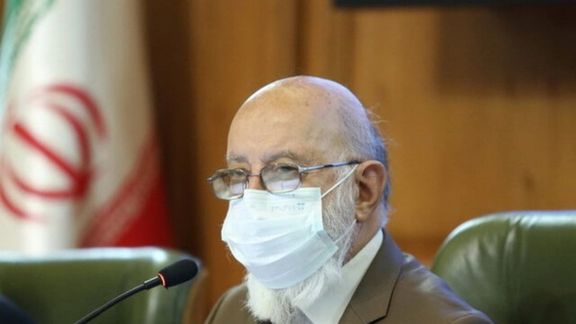
The chairman of Tehran’s city council says that last week cyberattack was carried out by Mossad, the Mujahedin-e-Khalq (MEK), and all forces against the Islamic revolution.

The chairman of Tehran’s city council says that last week cyberattack was carried out by Mossad, the Mujahedin-e-Khalq (MEK), and all forces against the Islamic revolution.
Mehdi Chamran made the remarks on Tuesday in reference to the Thursday attack that deactivated over 5,000 surveillance cameras and 150 websites and online services of Tehran Municipality. An Iranian hacktivist group named ‘Uprising till Overthrow' took responsibilty.
“Detailed planning was carried out by the Mossad and the “hypocrites” and the cooperation of the two with all the counterrevolutionaries and those who oppose the Islamic Republic,” he said. Iranian officials always refer to the exiled MEK as 'hypocrites'.
His comments came as most of the services are still offline and the authorities have warned all municipal employees against turning on their systems, suggesting that the municipality has not yet figured out how their systems were breached.
During the same session, Asghar Ghaemi, a member of the Council, said, "We should apologize to the people of Tehran for this cyberattack,” expressing hope that the damages to the municipality will be compensated and services will be back online.
The hacktivist group, reportedly affiliated with the MEK, put photos of the leaders of the group Massoud and Maryam Rajavi as well as insults at Khomeini, Supreme Leader Ali Khamenei, and President Ebrahim Raisi on the websites of Tehran Municipality. The MEK released a video clip showing the websites defaced with a graphic with an image of Khamenei with a red 'X' over his face, while calling for an “uprising until overthrow.”
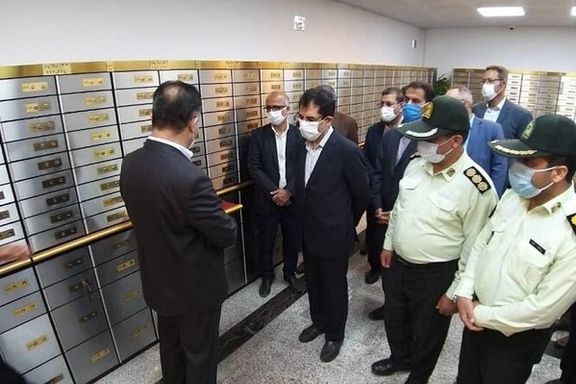
State media has played down a bank heist that saw thieves break into at least 200 safety deposit boxes in a central Tehran branch of Iran’s largest bank.
Bank Melli (National Bank), which is state-owned, issued a statement Monday saying thieves had entered its branch near the University of Tehran and accessed fewer than 200 safety deposit boxes.
The bank is about half a mile from the headquarters and residence of Supreme Leaser Ali Khamenei.
Iran was in a four-day holiday from Thursday to Sunday marking the death anniversary of Ayatollah Ruhollah Khomeini, founder of the Islamic Republic. Apparently, the robbers gained access from an adjacent building during the holiday, and it is not clear how long they were inside.
Officials said an investigation was underway, with several bank employees “under observation” for possible “dereliction of duty.”
The gall of the robbers has fed social media speculation, and even comparisons with famous bank robberies elsewhere in the world, like the 1983 Brink’s Mat heist in the United Kingdom. Bank Melli denied social media reports that 1,000 boxes had been breached and referred simply to an “incident” in a press release.
Most state media avoided lengthy reports while also denying that as many as 1,000 boxes had been breached. State broadcaster IRIB put the number of safety deposit boxes opened at 250, while others used the phrase ‘damaged boxes.’
Inside job?
IRIB said that the thieves appeared to have been familiar with the bank’s interior and had stolen the main device recording footage from surveillance cameras. IRIB revealed that the bank’s alarm was not connected to the police and had only sent a text message to the branch manager, who ignored it as the system had been prone to false alerts.
The robbery is seen by some as an ‘inside job,’ and by others as another example of official ineptitude following the collapse of a high-rise building May 23 in Abadan, a refinery city in the oil-rich Khuzestan province, which killed at least 40 people and is widely seen as the result of officials ignoring warnings from engineers in allowing the owner to add five more floors. The disaster led to anti-government protests in the province and elsewhere.
As 80 percent of the economy is controlled by the government, including the banking sector, ordinary people often see such incidents as the result of inefficiency, personal and political nepotism and in some instances corruption.
Media and officials in Tehran say it is not clear what the bank robbers stole from the safety deposit boxes, since banks have no information about what people put in these boxes, which are used to safely store personal mementoes, precious foreign currency, and gold coins bought as a hedge against inflation.
It is also not clear if there is any kind of insurance covering losses sustained by customers. One report last year suggested Iranians were keeping $25-$30 billion in cash “at home,” which would include money in bank deposit boxes.
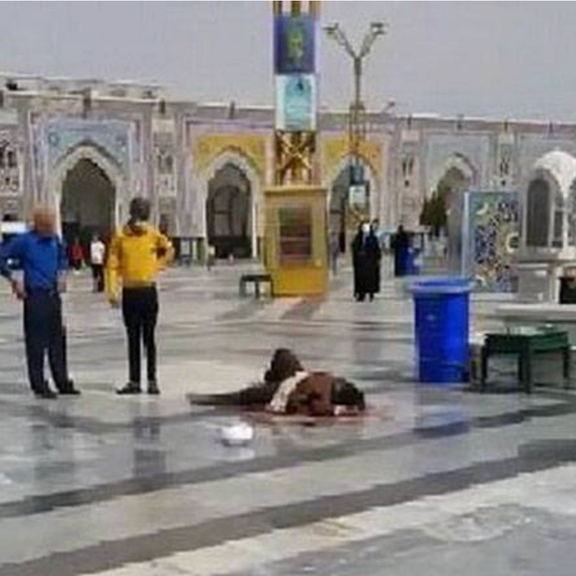
A court in Iran has sentenced a man to death for killing two clerics and wounding a third in a knife attack at a holy Shi'ite Muslim shrine in April, the judiciary said on Tuesday.
"The revolutionary court sentenced him to death ... and his lawyer has appealed. The case has been sent to the Supreme Court," judiciary spokesperson Masoud Setayeshi told a news conference carried live on a state-run website.
Officials said the attacker was Abdullatif Moradi, a 21-year-old ethnic Uzbek from Afghanistan with radical Sunni views. He was arrested after the stabbings at Iran's largest Shi'ite Muslim religious complex in the northeastern city of Mashhad.
Top officials and clerics had reacted strongly to the incident and called for a speedy trial in the case.
Attacks on clerics and government officials have been rare in Iran after authorities tightened security measures and cracked down on opposition groups following a string of attacks and bombings that killed dozens of officials and clerics following the 1979 Islamic revolution.
However, a senior conservative cleric was slightly hurt after being attacked by a man with a knife after Friday prayers last week in the central city of Isfahan.
There have been weeks of unrest in Iran after a jump in food prices and amid public anger with government leaders and powerful clerics over a deadly building collapse last month that was widely blamed on corruption and lax safety measures.
With reporting by Reuters
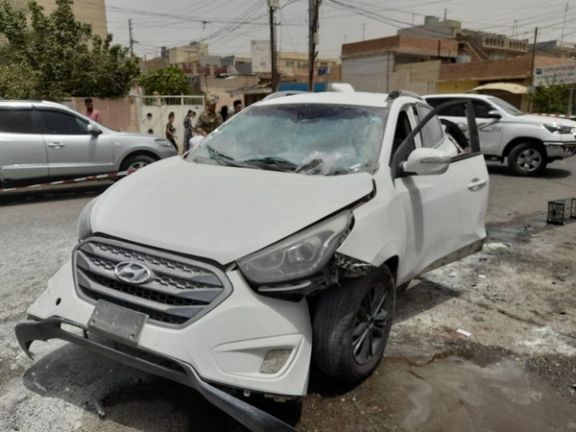
A senior member of the Organization of the Iranian Kurdistan Struggle has accused the Islamic Republic of being behind an assassination attempt on fellow fighter Akbar Sanjabi.
Shoresh Haji, a member of the governing committee of the opposition group – known as Khabat that is the Kurdish word for "struggle" -- told Iran International on Tuesday that the former political prisoner, 49, was injured when a bomb that was attached to his car detonated in Erbil, the capital of the Kurdistan Region in Iraq on Monday.
He called the attack a terrorist act, and called on the Iraqi Kurdistan Region security agencies to conduct an extensive investigation into the assault.
The political activist, who was severely injured in the left leg and was taken to Erbil’s Emergency Medical Center, had been sentenced to life in prison by Iranian authorities for membership in the Albania-based opposition group Mujahedin-e-Khalq (MEK) organization. While on a temporary leave, Sanjabi left the country and settled in Erbil.
In 2021, two political activists and members of the Kurdistan Free Life Party (PJAK) and the Democratic Party of Iranian Kurdistan (KDPI), Behrouz (Rebin) Rahimi and Musa Babakhani, were assassinated in the cities of Sulaimaniyah and Erbil.
Although the Islamic Republic has not claimed responsibility for any of these assassinations, their respective parties have blamed the Iranian government for the attacks.
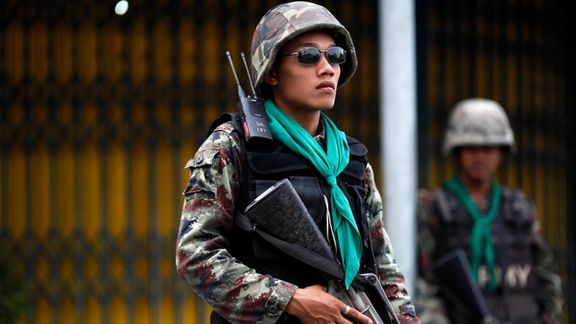
Following warnings that Iran was planning attacks on Israeli citizens in various parts of the world, Thailand’s police have are on high alert to find the Islamic Republic’s agents.
A police source told the Bangkok Post on Monday that the Royal Thai Police (RTP) has issued a secret order to officers across the country to keep an eye out for spies from Iran believed to be in the region after one was arrested in Indonesia last year.
According to the source, security agencies are closely monitoring the movements of Iranian nationals and gathering intelligence about some Shiite Thai Muslims who are suspected to be working as the Islamic Republic’s agents.
The source said the order cited an incident in May last year when Indonesian authorities were tipped off that a man named Ghassem Saberi Gilchalan arrived in the country carrying a fake Bulgarian passport.
He was arrested just before departing for Qatar, and was sentenced to two years in jail. Police found that he entered the country more than 10 times using false papers and had 11 mobile phones with the names of some Thai Muslims saved on them.
Following interrogations, Gilchalan confessed that he had been given several assignments by a former Iranian diplomat in Malaysia to act as a spy both there and in Indonesia several times, the latest of which involved lobbying Indonesian authorities to release the Iranian-flagged MT Horse oil tanker apprehended there January last year.

In May, an Israeli informed source told Iran International that security measures are tight around the Israeli embassy in the Indian capital New Delhi reportedly over a serious possibility of an attack by Iran-backed elements.
Late in May, President Ebrahim Raisi said Iran will “definitely” take revenge for the spectacular assassination of Revolutionary Guard Qods (Quds) Force colonel Hassan Sayyad-Khodaei in Tehran. Sayyad-Khodaei, who Israeli media say was the acting commander of an elite Qods Force unit, Unit 840, was shot dead behind the wheel of his car by two gunmen who fled the scene on a motorbike.
A few days later, Fars news website in Iran affiliated with the IRGC published an article profiling several Israeli businesspeople, using thinly veiled threatening language.
Moreover, conflicting reports are still circulating about the death of Iranian aerospace scientist Ayoob Entezari -- who held a PhD in mechanical and aerospace engineering -- with some calling it an assassination and government saying he died of food poisoning.
Reports about Entezari’s fate came a day after Iran confirmed the death of a colonel from the Quds Force, Ali Esmailzadeh of the Islamic Revolutionary Guard Corps. Iranian government and IRGC media said that Col. Esmailzadeh died “in an incident in recent days” at his home without mentioning any details after Iran International quoted sources in Iran as saying that the IRGC killed him over suspicions of espionage.
Last week, Israel issued a warning to citizens traveling or planning to travel to Turkey that they could be targeted by Iranian operatives seeking to avenge the recent assassination. The National Security Council explicitly identified “Iranian terrorist operatives” as being the source of the threat to Israelis in Turkey and nearby countries. Israel’s Channel 12 news reported on Sunday that Israel is considering expanding the travel warning to additional countries.
Early in May, a short audio recording was published by Israeli media with a photo of a man introduced as Iranian national Mansour Rasouli, 52. In the audio recording, Rasouli says he was sent to Turkey by the Revolutionary Guards (IRGC) to establish an operational network to assassinate an Israeli diplomat in Istanbul, a Germany-based US general, and a journalist in France.
Later in May, Israel’s security agency Shin Bet uncovered an alleged plot by Iranian intelligence to lure Israeli academics and former defense officials to travel abroad in order to kidnap them. The Iranian operatives used the stolen identities and relevant cover stories in an attempt to gather intelligence about Israelis and to invite them to locations abroad -- some under the guise of a conference -- in order to abduct or harm them.
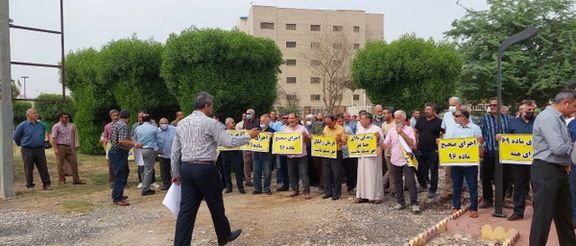
Iranian retirees held demonstrations Monday in several cities across the country to protest the meager rise in their pensions while the inflation rate is hovering over at over 40 percent.
The pensioners took to streets in the capitals of many provinces such as Tabriz, Gilan, and Kermanshah, while several cities across the southwestern oil-rich Khuzestan province, including Ahvaz, Dezful, Abadan, and Shushtar, were also scenes of similar protests.
The enraged protesters chanted slogans such as “Death to Raisi” and "Shame on you incompetent minister”, against the government and “empty promises” by authorities.
Retirees are demanding pension increases in par with rising prices of essential foods, saying that the current payments are not in line with decrees by the Supreme Labor Council, which had stipulated a 38-percent increase in the minimum wage.
The protests occurred as the government spokesman Ali Bahadori Jahromi said in a tweet on Sunday that the minimum wage for retirees covered by the Social Security Organization has risen by 57 percent, calling it “one of the largest increases in 20 years and nearly 20 percent above the official inflation rate.”
With food prices rising faster after four years of United States’ ‘maximum pressure’ sanctions, Iranian workers and retirees and workers have been holding regular protests or strikes to demand higher salaries.
Moreover, the collapse of a ten-story Metropol building in Abadan in May has sparked anti-government rallies that have spread to other cities in the southwestern Khuzestan province and elsewhere.